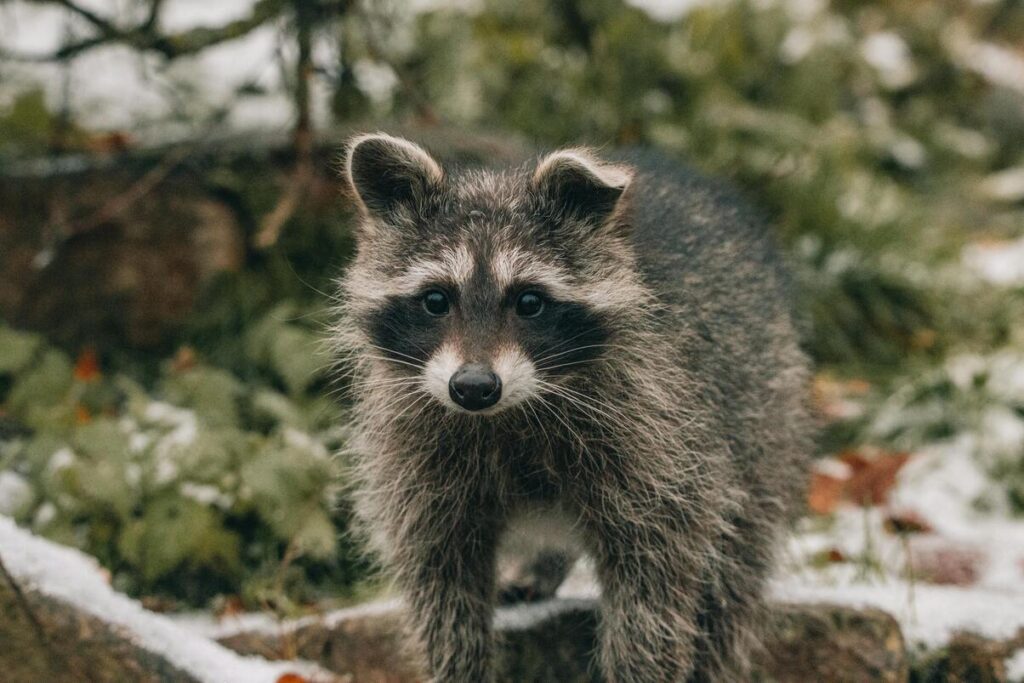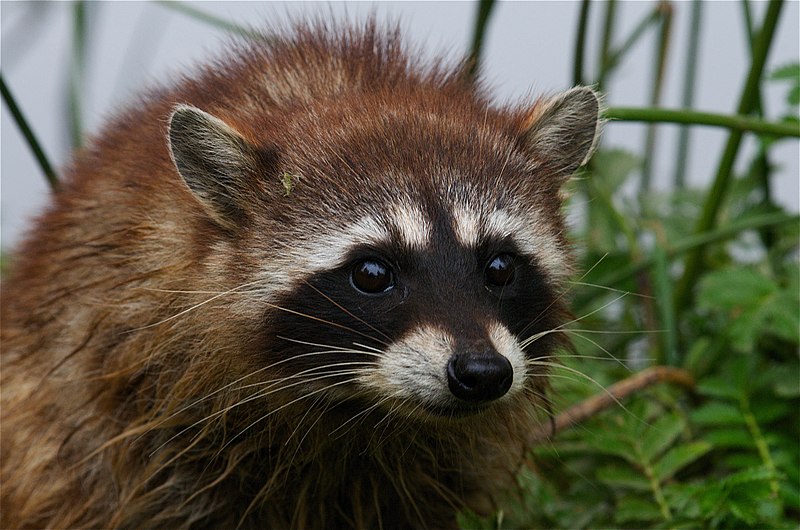The best way to deal with raccoons is not by poisoning them.
Raccoons can be cute, but when they start rummaging through your trash or setting up camp in your attic, they become less adorable and more of a nuisance. If you’ve ever wondered, “How do you poison a raccoon?” I’m here to tell you why that’s not the best idea and offer some better alternatives.
Picture this: it’s 2 AM, and you’re jolted awake by the sound of clanging metal and the unmistakable rattle of a raccoon party in your garbage cans. Annoying? Absolutely. But before you reach for a quick and drastic solution like poison, let’s take a step back and consider the bigger picture.
Poisoning raccoons is not only illegal and dangerous but also inhumane. There are more effective, humane ways to deal with these furry intruders that don’t involve breaking the law or harming other animals. In this article, we’ll dive into why poisoning is a bad idea, explore the fascinating behavior of raccoons, and share some tried-and-true methods to keep them out of your hair (and your trash).
So, grab a cup of coffee (or maybe something stronger if it’s been a particularly raccoon-filled night) and let’s tackle this problem together. Because trust me, there’s a better way to handle our masked visitors.
Key Takeaways
- Poisoning raccoons is illegal and dangerous.
- Humane and effective alternatives exist.
- Understanding raccoon behavior can help in deterring them.
Why Poisoning Raccoons is a Bad Idea
Illegal and Inhumane
First things first: poisoning raccoons is not only a terrible idea, but it’s also illegal in many places. Wildlife protection laws are in place for a reason. These animals, even when they’re being a nuisance, are part of our ecosystem. Poisoning them can lead to severe penalties, including hefty fines and potential jail time. Beyond the legal implications, there’s the ethical side to consider. Poisoning is a slow, painful, and inhumane way for any animal to die. We have a responsibility to treat wildlife with respect and to look for humane solutions to our problems.
Danger to Other Animals
When you set out poison for raccoons, it’s not just the raccoons at risk. Pets, like dogs and cats, and other wildlife can easily ingest the poison, leading to unintended and often tragic consequences. Imagine your neighbor’s beloved pet or even your own furry friend falling victim to the poison meant for raccoons. It’s a heartbreaking scenario that is all too possible.
Environmental Impact
The poison doesn’t just stop at the raccoon. If a poisoned raccoon is eaten by another animal, such as a hawk or a fox, the poison can be passed up the food chain, causing a ripple effect of death and suffering among local wildlife. Additionally, poison can seep into the ground, contaminating soil and water sources, and potentially harming plants and other organisms in the ecosystem. The environmental impact of using poison can be widespread and devastating, far outweighing the inconvenience of a raccoon rummaging through your trash.
Instead of turning to such harmful methods, let’s explore some better ways to handle our raccoon problem. By understanding these masked bandits a bit better, we can find more effective and humane solutions to keep them at bay.

Understanding Raccoon Behavior
Why Raccoons Invade
So, why do raccoons keep showing up at your place like uninvited guests to a party? The answer is simple: food and shelter. Raccoons are opportunistic feeders, meaning they’ll eat just about anything they can get their little paws on. If your trash cans are easily accessible, or if you leave pet food outside, you’re basically rolling out the red carpet for them. Additionally, raccoons seek out cozy, safe spots to nest, especially during breeding season. Your attic, basement, or even your porch could look like prime real estate to a raccoon looking for a place to call home.
Raccoon Habits
Raccoons are nocturnal creatures, which means they’re most active at night. This can make them seem even more mysterious and troublesome since their antics usually occur while you’re sleeping. They have incredibly dexterous front paws, which allow them to open doors, jars, and, yes, your trash cans with ease. These critters are also highly intelligent and adaptable, which is why simple deterrents might not always work. They learn quickly and can figure out how to bypass many of the obstacles we set up to keep them out.
Social Structure and Communication
Raccoons are typically solitary animals, but they do communicate and can be quite social when necessary. They use a variety of vocalizations, body language, and scent markings to communicate with each other. Understanding this can help you recognize when a raccoon is just passing through or when it has decided to settle in your area. If you hear chattering, growling, or purring sounds at night, chances are there’s a raccoon nearby, either looking for food or trying to establish a territory.
By getting a better grasp of why raccoons do what they do, we can develop strategies that target their specific behaviors and needs. This not only makes our efforts more effective but also ensures that we are treating these animals humanely and with the respect they deserve.
Humane Alternatives to Poisoning
Securing Food Sources
The first step in keeping raccoons at bay is to eliminate their food supply. Here are some practical tips to make your property less appealing to these furry intruders:
- Raccoon-Proof Trash Cans: Invest in heavy-duty trash cans with secure lids that raccoons can’t easily open. Bungee cords can add an extra layer of security.
- Store Pet Food Indoors: Feeding your pets outside is an open invitation for raccoons. Keep pet food indoors and clean up any spills immediately.
- Compost Piles: If you compost, make sure your compost pile is well-secured. Use a raccoon-proof compost bin or regularly turn the pile to discourage raccoons from digging through it.
Physical Barriers
Creating physical barriers can effectively keep raccoons out of specific areas. Here’s how:
- Fencing: Install a sturdy fence around your garden or yard. Ensure it’s at least four feet high and buried a foot underground to prevent raccoons from climbing over or digging under.
- Raccoon Baffles: If you have bird feeders, use raccoon baffles to prevent them from climbing up the poles. These can be purchased or DIYed with some basic materials.
- Seal Entry Points: Carefully inspect your home for any potential entry points, such as gaps in the roof, vents, or foundation cracks. Use steel mesh or hardware cloth to seal these areas securely.
Deterrents and Repellents
There are various deterrents and repellents you can use to make your property less appealing to raccoons:
- Natural Repellents: Raccoons dislike strong smells like ammonia, peppermint oil, or vinegar. Soak rags in these substances and place them around areas where raccoons are active.
- Motion-Activated Devices: Install motion-activated lights, sprinklers, or noise makers. These devices startle raccoons and make your yard less inviting.
- Ultrasonic Repellents: These devices emit a high-frequency sound that’s annoying to raccoons but inaudible to humans. Place them around your yard to keep raccoons at bay.

Long-Term Solutions and Professional Help
Habitat Modification
Making your property less attractive to raccoons is a long-term strategy that can help prevent future infestations. Here are some tips to modify your habitat:
- Landscaping: Keep bushes and trees trimmed, especially those close to your house. Overgrown vegetation provides cover for raccoons and easy access to roofs and attics.
- Remove Potential Shelters: Clear out woodpiles, debris, and other potential nesting sites from your yard. If you have a shed or outbuilding, ensure it is securely closed.
- Secure Bird Feeders: While it’s nice to feed the birds, raccoons often see bird feeders as an easy food source. Use raccoon-proof bird feeders and clean up any spilled seed regularly.
When to Call a Professional
Sometimes, despite your best efforts, raccoons can be particularly persistent. In such cases, it may be time to call in professional help. Here’s when you should consider this option:
- Persistent Problems: If raccoons continue to invade your property despite your efforts, a professional can assess the situation and offer more advanced solutions.
- Infestation Signs: If you notice multiple raccoons or signs of a large infestation (such as extensive damage or droppings), a professional wildlife control expert can help manage the situation safely.
- Safety Concerns: If you ever feel unsafe dealing with raccoons or if they are behaving aggressively, it’s best to leave it to the professionals.
Choosing a Humane Wildlife Control Service
When selecting a wildlife control service, it’s important to choose one that uses humane methods. Here are some tips to ensure you’re making the right choice:
- Check Credentials: Ensure the company is licensed and has good reviews from other customers.
- Ask About Methods: Inquire about the techniques they use to handle raccoons. Humane methods should focus on exclusion, relocation, and habitat modification rather than lethal control.
- Follow-Up Services: A good wildlife control service will offer follow-up visits to ensure the raccoons have not returned and to help you implement long-term prevention strategies.
Conclusion
Dealing with raccoons can be a challenge, but poisoning them isn’t the answer. By understanding their behavior and using humane deterrents, you can keep these masked bandits at bay. Remember, the goal is to coexist peacefully with wildlife while protecting your home and garden.
Poisoning raccoons might seem like a quick fix, but the long-term consequences far outweigh any short-term benefits. Not only is it illegal and inhumane, but it also poses significant risks to other animals and the environment. Instead, by securing food sources, setting up physical barriers, and using deterrents, you can effectively keep raccoons out without causing harm.
Understanding raccoon behavior helps in devising more effective strategies. These intelligent creatures are simply looking for food and shelter, and by making your property less attractive to them, you can encourage them to move on. And when your efforts aren’t enough, don’t hesitate to call in professionals who use humane methods.
So, the next time you hear the unmistakable sounds of raccoons rummaging through your trash, remember: there’s a better way to handle the situation. Together, we can find solutions that respect both our space and the wildlife that share it with us.














